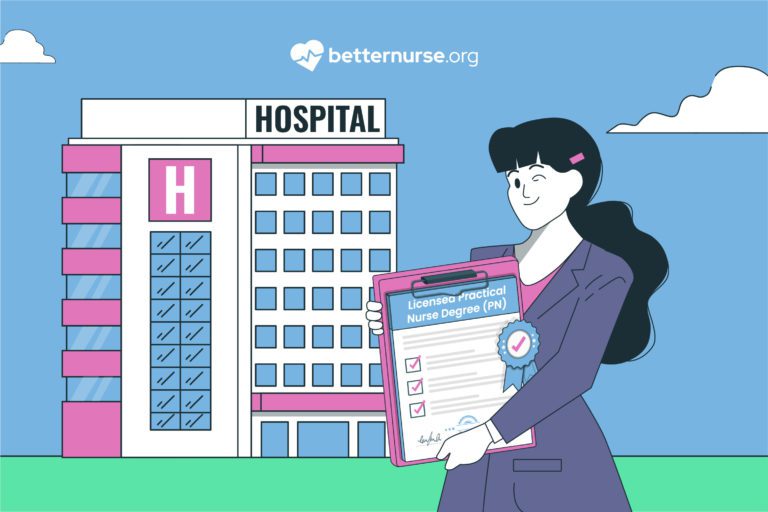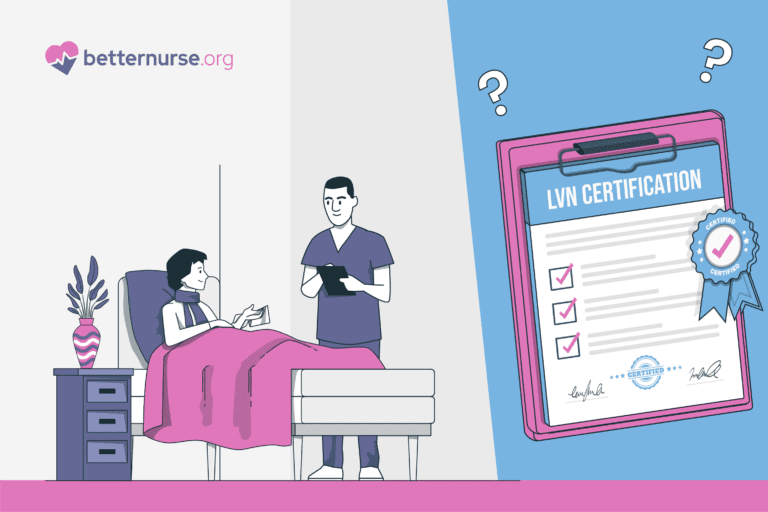Licensed Practical Nurse (LPN) and Licensed Vocational Nurse (LVN) Program Overview
(LPN) Degree
Find out what licensed practical nurses (LPN) do, where they work, how much they make, how you can become one, and why you’d want to.
Average LPN Program Length
1 years
Average Credits Required For LPN
45-50 credits
LPN Average Annual Salary
$47,480
Opportunities With an LPN/LVN
Quicker Entry
The LPN/LVN route can be a quicker and less expensive path to employment in the nursing field.
Path to Advancement
Many LPNs and LVNs work in their field for one or two years, and then eventually return to earn their bachelor’s degree.
Explore the Nursing Field
Becoming an LPN/LVN allows you to get experience and see if nursing is a good fit for you before committing to a longer program.
Skills Learned
Patient care, teamwork, and communication and organizational skills.
Work Settings for LPN/LVN Graduates
An ADN program offers learners one of the fastest paths to becoming an RN. On this page, find admission requirements, earning potential, and much more.
Nursing Care Facilities
Mental Health or General Nursing Care Facilities
Medical and Surgical Hospitals
Home Healthcare Services
How Much Will I Make With an LPN/LVN Certificate or Diploma?
How To Become an LPN/LVN
State-approved LPN and LVN programs are typically offered through technical schools and community colleges, though some hospitals and high schools also offer training.
Applicants are usually required to have either a high school diploma or GED certificate. Some programs may require that applicants take the TEAS exam.
LPN and LVN programs feature academic, lab, and clinical components. Coursework covers the fundamentals of nursing and human anatomy, and clinical requirements can be completed at healthcare settings like hospitals and nursing homes.
Students can finish an LPN/LVN program within a year to 16 months.
This exam is administered by the National Council of State Boards of Nursing (NCSBN), and is used to assess a candidate’s readiness to work as a practical or vocational nurse.
Candidates typically wait around six weeks to receive their score. Upon passing, they are eligible to apply for licensure and begin working.
Admission Requirements
for an LPN/LVN Program
Aspiring LPNs and LVNs can pursue programs in community colleges, technical schools, hospitals, and high schools. Students should note that requirements vary by institution. However, schools typically require each applicant to hold a high school diploma or GED certificate and a minimum 2.5 GPA.
While programs do not require prerequisite coursework beyond standard high school courses, a solid background in math and science helps students excel in these programs. A vocational nursing applicant may also need to provide letters of recommendation and a resume.
Core Concepts in an
LPN/LVN Program
LPN/LVN education prepares graduates to apply nursing processes in healthcare settings to promote healing. Schools also focus on creating ethically driven professionals who work within the legal boundaries of LPN/LVN professional practice. LPN and LVN programs examine nursing competencies and theories, including the following:
- Medications
- Fundamentals of nursing
- Anatomy of the human body
- Processes of disease
- Mental health nursing
- Geriatric nursing
- Maternal and pediatric nursing
Students also learn to provide high quality care and examine the best strategies for developing care plans for specific populations. The following are typical courses focused on specialized care giving:
LPN/LVN Advantages
- Only requires a year of school
- Can begin accruing professional experience quickly (e.g., running a feeding tube)
- Creates a competitive advantage when applying to advanced nursing programs
LPN/LVN Disadvantages
- Does not qualify for leadership opportunities
- Cannot work in as many settings as RNs
- Has limitations to scope of practice compared to RNs
- Must work under a licensed professional at all times
- Does not earn as much as RNs
Questions About LPN and
LVN Programs
Admission requirements for two-year ADN programs vary by school. However, applicants must typically submit:
Interested students considering careers as LPNs or LVNs can earn their degrees online. Courses may follow an asynchronous format, allowing enrollees to complete coursework at any time to meet their deadline dates. Assignments may include exams, essays, and projects. Students engage with instructors and peers through online discussion boards and email. Other online courses may use a synchronous format, which requires live attendance through students’ webcam. Synchronous learning still requires degree seekers to submit assignments digitally.
While students can complete courses online, programs require in-person attendance for clinicals and other field experiences.
The nursing field offers professional opportunities at multiple levels, allowing students to begin working without an extensive time commitment to their education. Aspiring professionals who need to begin working quickly often choose to complete LVN or LPN requirements, which comprise a year of education before entering the field. Professionals who earn LPN or LVN credentials before entering RN programs gain more experience, which creates a competitive edge when applying to ADN or bachelor of science in nursing (BSN) programs. However, an LPN certificate comes with limitations in the field. For instance, LPNs do not qualify for leadership opportunities and cannot work in as many settings as RNs.
LPNs must work under licensed professionals at all times and do not earn as much as RNs.
BLS projections indicate that employment for LPNs/LVNs will grow by 9% from 2019 to 2029, demonstrating ample opportunities in the profession. Demand for nurses, as a whole, continues to increase. The job can be stressful, nurses spend a good part of their workday on their feet, for instance, but it is also highly rewarding.
Not every MSN program requires test scores, but some request students to submit GRE or MAT scores.
An LPN/LVN certificate program usually takes one year to complete, including 500-750 hours of requisite clinical experience depending on state requirements. Factors affecting the timeframe include full-time or part-time enrollment, the number of clinical hours required by the school and state, and whether students need to fulfill any general education requirements.



